Q&A: Healthcare workers share their COVID-19 experience around the country
Amidst the global pandemic, healthcare workers have put their lives on the line. Here are their experiences.
Healthcare workers are an important part of the modern world, especially as they navigate the COVID-19 pandemic.
While millions are out of work in the U.S., the medical field can’t seem to find enough work in some places due to the pandemic. According to the New York Post, at least 26 healthcare workers have died from COVID-19. In order to fight the virus, other medical attention has been delayed as well.
Amidst the horror stories of these determined workers on the front lines, here are some of the measures taken by some of our United States healthcare workers to protect themselves from the virus, along with their advice and thoughts on the virus itself.
The Workers
Tristan Nash, a perfusionist at Baptist Health Louisville/Floyd, works in the operating room during heart surgery to monitor the heart and lung machines.
Rachel Thrush, a certified clinical perfusionist of Ohio Health at Mansfield Hospital, works in the operating room monitoring the heart and lung machines.
Erin Aghamedi, a traveling perfusionist for Specialtycare in San Diego, California, works for the University of California San Diego traveling to various hospitals in La Jolla, Temecula Valley and Murrieta California.
Mark Aghemedi, a cardiovascular perfusionist at Sharp Memorial Hospital in San Diego, California, works in the operating room during heart surgeries to monitor the heart and lung machines throughout the entire surgery.
Chad Borkwoski, a technical service specialist for Abbott Cardiac Rhythm Management and Registered Nurse, provides pacemakers and defibrillators to physicians and assists with the programming of the implanted devices.
Matt Williams, an attending heart surgeon for the Pennsylvania Presbyterian Medical Center, works in the operating room.
Brent Benton, a hospitalist physician at Baptist Health Louisville, currently cares for COVID-19 patients that have required hospital admission.
Their Insight
How has work-life changed since the start of this pandemic?
Nash: “COVID has changed a lot of things at work. Right now we are only doing urgent emergency cases, cases that cannot wait to be done. Our group has gone from anywhere between eight to 12 hearts a day to maybe one if we’re lucky. We are a small company contracted through the hospital, so it has definitely affected us from a financial standpoint.”
Thrush: “Since the onset of the pandemic, we have seen a sharp drop in our cases. We no longer do elective surgeries, patients that can stay at home and wait without risk of their disease progressing. We are working less hours, and some days, not working at all. I am currently a salaried employee, so my pay has not been affected. Ohio Health as a whole has agreed to pay the full salaries of all employees who are willing to work at this time until June 1st, regardless of hours worked. We have gone through many protocol changes, sometimes daily since this has started. Currently, we have to enter and exit the hospital in specific doors and get our temperature checked upon entering. We are also required to wear a mask during our entire shift, which must be turned in at the end of our shift to be cleaned and sterilized and reused. At this point, we are waiting for a peak to see if we will be required to be deployed to Columbus to help there.”
Erin Aghemedi: “I went from working an average of four to five days a week to two to three. I still travel to all of the hospitals. Our hospitals are only performing urgent/emergency cases, so the workload has dropped. The amount of calls is the same and I find myself working later in the day as opposed to morning start cases. Also, the hospitals have limited staff entrances to one door, where we have to answer a series of questions about our symptoms, have our temperature taken and are issued a mask to wear through the halls. Eating and drinking in the staff lounge has become a difficult situation while trying to practice social distancing. It’s virtually impossible, so you wonder if your coworker next to you is infecting you.”
Mark Aghemedi: “Work-life has changed dramatically since the start of this pandemic. I have not worked in over a month due to our hospital stopping elective procedures and ensuring that we have enough beds open in case a COVID outbreak happens. Also, the hospital itself has changed because they have scrambled to enact new procedures and protocols due to the infectious nature of COVID. These protocols are likely to stay in place for a long time, if not indefinitely.”
Borkowski: “We have shifted gears from an in-person world to a virtual world. E-learning, E-meetings — a lot of emails that show many meetings could have been emails, virtual assistance for programming of pacemakers/defibrillators and connecting PT’s home monitors so they can be monitored remotely rather than coming into the office. It has been stressful learning all the new modalities of communicating, creating presentations, etc. Surprisingly, my hours have remained consistent, approximately 45 to 60 a week. Much of the work is completed via WebEx, Telehealth, email or phone calls. Procedures have been reduced from elective to only emergency cases. In my case, I am still doing a lot of cases because patients need pacemakers for slow heart rhythms.”
Williams: “I’m working much less, actually — a plan was put in place for me to be an ICU doctor if the COVID census in ICUs rose above a certain threshold, but we haven’t had enough patients for that plan to kick in. So, I still do heart surgery, but much less of it. I’ve gone from doing six to eight cases per week to two to three. We are only operating on the most urgent patients right now.”
Benton: “The thing everyone knows is that we have to use a lot more personal protective equipment now. Something kind of unforeseen is that the precautions that were enacted by the state government may have in fact flattened the curve. The peak is getting closer and the peak is estimated to be much lower. As part of that, with the cancelation of all elective procedures, the hospital is not busy at all. We typically have 200 patients a day in the hospital, but for the past several weeks, we’ve only had 100 patients a day in the hospital. They’ve had to shut down whole portions of the hospital. They’ve had to furlough hospital staff and nurses because they don’t have any work for them to do. All in preparation for the potential, what they call, ‘surge’ that may overwhelm the hospital. It hasn’t so far. So it’s very strange to see New Orleans, New York City, completely overwhelmed with volunteers rushing there while we have little to do here.”
What steps have you taken to keep yourself as well as your family safe during all of this?
Nash: “Obviously, it’s hard to social distance inside of your home, and I don’t have any children in the house, so that makes things a little easier. Always washing hands after you’ve been out, and eating healthy…lots of oranges! I leave my work shoes in the garage and try to shower immediately when I get home from the hospital.”
Thrush: “At home, we are practicing social distancing. We try to place all of our orders for food and supplies for pick up orders. If we need to go in stores, only one of us goes in and we wear a mask and sanitize our hands before and after, followed by hand washing once home. We have been working on hand washing and using foam hand sanitizer with my kids. I also have been using On Guard essential oils in our home and rolling on our kids to help boost the immune system. We are taking our vitamins and trying to keep vitamin C rich foods plentiful in our diets.”
Erin Aghemedi: “We now make sure we have masks in the car, as well as hand sanitizer. We try to maintain the six feet for social distancing as well and sanitize our hands as soon as we get back in the car from being in public. Going to the grocery store is a nightmare and virtually impossible to socially distance and minimize the time spent inside the stores. We used to shower after getting home or change our clothes, but we have gotten away from that. When I get home from work, I do shower though. We do try to sanitize the kitchen more frequently, which is our drop off zone for outside goods that we purchase. Shoes are always taken off in the garage.”
Mark Aghemedi: “Me and my wife are taking many steps to avoid this virus. We are self-quarantining about 90% of the time, and not going out unless we are walking our dog or grocery shopping. We limit the trips to the grocery store to once every two weeks, and when we buy food we stock up for about two weeks. We wear masks when we go to the store and try our hardest to keep three to six feet away from people. When we come home from being out we always wash our hands immediately and we are constantly cleaning the areas in our home that we spend the most time in.”
Borkowski: “Since I am frequently out of the house and in hospitals, I do the shopping/going to stores to prevent my family from being out. I have been wearing a mask at all times while in the hospital. Hand hygiene has not changed, as I am a nurse and frequently wash my hands.”
Williams: “We are all wearing surgical masks when we go outside the house. I am very focused on hand hygiene while at work as well as distancing, when possible. I also change before entering my house and shower immediately.”
Benton: “I cut off my long hair and beard, and started wearing Crocs for the first time so that they can be cleaned easily before I leave the hospital. I probably take a little bit more care when I’m done with my day at work when cleaning up at the hospital, personally — not so much as others in my group.”
Based on your experience with working in a healthcare profession, how long do you think this could all go on?
Nash: “I feel that we are going to see quite a few COVID-19 patients for the rest of the year. I think that the social distancing that we have done has really made an impact on not having a surge of patients that we cannot treat, and that was very important. We also don’t know everything about this virus. There could be another outbreak during the fall season, or perhaps some relapsed patients. Until there is a vaccine, it’s going to be around. Hopefully, hospitals will get to a point in the next couple of months where we are doing more elective surgeries. This is really killing the economy, locally and globally.”
Thrush: “It is very hard to predict when this could end. I foresee this being a seasonal threat, similar to influenza. I believe this will change the way some things are done forever. Until we have a vaccine, wearing masks and practicing social distancing may be our reality.”
Erin Aghemedi: “I think because the entire nation wasn’t locked down together and because some states are already reopening, we will be seeing the effects of COVID infections/mask-wearing, etc. into June, with an early resurgence in October when normal flu season starts. Truly, I think this will be ongoing through the rest of the year.”
Mark Aghemedi: “That’s a very hard question because, unless we have adequate testing, we are never going to know the actual outbreak numbers. This virus seems to spread very quickly and has a longer incubation period than the flu. The more testing we get, the more accurate our ‘curve’ will be, and there is most likely going to be a second wave of this. So, in my opinion, knowing that, even though we don’t have a lot of tests and we have the largest numbers in the world, I would say July 1st looks like a good estimate.”
Borkowski: “I worked in an ICU through the H1N1 pandemic, which lasted approximately two months [having critically ill patients]. I feel the lockdown state will be similar to that, two to three months. Afterward, I feel we should have businesses reopen with restrictions on the amount of people allowed in a building at one time and to socially distance while in said establishments, ie., sitting at every other table at a restaurant. With the increase in testing for COVID-19, the more it is studied and the more that is known about the virus, truer statistics and more appropriate measures will be put in order. There will be no way of knowing if we overreacted to this, but it is certain we will know if we under-reacted. I am, however, scared at the precedence this is setting for future virus outbreaks, such as if influenza A or B is deadlier than usual this fall – are we going to lock everything down again?”
Williams: “Through 2021, though I don’t think shelter-in-place will last that long. More and more human activity will be allowed but with a constant threat of shutting back down if numbers of infected and ill people rise too fast.”
What advice would you give to family, students, parents, community members, etc.?
Nash: “As far as advice goes, educating people that don’t know much about this novel virus and how it is affecting people so differently is important. There’s no telling how serious your symptoms might be. Using social distancing, masks, washing your hands and avoiding mass group functions is pretty vital right now, but I also feel like we are gaining a lot of perspective on what is truly important in life. Maybe finding more gratitude for the things and people we have in our lives. Everything is temporary, and this will pass, too.”
Thrush: “My only advice is to try to stay home. Protect yourself and your loved ones. Practice social distancing. Do whatever you can to boost your immune system. Try to have fun and soak up the time at home. Get exercise, go outside, read a book. It is just as important to make sure your mental health is taken care of as your physical health.”
Erin Aghemedi: “I would advise continuing with social distancing, wearing masks, minimizing contact as much as possible and limiting trips in public until testing has been advanced and a vaccine has been developed. Resuming ‘normalcy’ too early will defeat the purpose of our efforts the past six weeks to ‘flatten the curve’ and will overwhelm our resources.”
Mark Aghemedi: “My advice as a health care worker would be to please take this virus seriously and do all the things the CDC recommends, washing hands, social distancing, etc. My advice as a human being is to stay calm and enjoy this time with your friends and family. FaceTime with friends, do puzzles with family members and use this time to reconnect. We get so caught up in work, deadlines, social networking and what famous people are doing that this time feels like a nice time to reset our priorities. Remember we are all alone, together.”
Borkowski: “Take this time to be more cognizant of personal space and hygiene. Stop wearing gloves everywhere! After everything you touch, you would need to change gloves! Research cross-contamination!
Students – my heart breaks for y’all missing out on the last few months of your senior year. Stay positive and strong. This is one of many obstacles and let downs you will have in your life. Try to take it in stride as much as possible and come out stronger on the other side. Also, do not take this time off. Continue to learn. Try a new hobby you never had time for before. Learn to bake or cook something. Spend additional time with your parents, all the things our busy lives usually don’t allow us to do. Take time to reflect on all the positives we have in our lives. Maybe incorporate this less hectic life into your daily routine once things go back to the ‘new normal.’
Teachers and medical professionals need to be paid at better rates.
Parents – protect your mental health. Do the best you can with trying to teach your kids, learning new apps for school, trying to provide for your family. It’s a stressful time. It’s not a competition, just do the best you can. Remember we are not all in the same boat; we are only in the same storm.”
Williams: “Recognize that the vast majority of people will not die from the disease, particularly if you are young and healthy. However, it should be taken seriously because people who are not young and healthy are at real risk of severe illness and death, and we should care about those people too.”
Benton: “The biggest thing is to just do what Governor Beshear is recommending. Again, you don’t get a second chance to do this. You have to do it right the first time. If you do it right, fewer people die and we could avoid a second wave. There’s concern that if we ease up on this, you could have a second peak because of the way viruses move through populations. And that would be bad because then, you’re talking about, ‘Maybe you don’t get to start your freshman year of college in August or September. Maybe your senior year of high school looks very much like your junior year. Maybe fall sports don’t happen.’ So, the most important thing to do right now is to believe what the governor is telling everyone to do and to continue to do it, because hopefully, this will peter out in the summer, and we can look back on it as something that happened in the first half of 2020 and then went away.”
Thank You
Each day, medical workers put their lives on the line to aid in the crisis. Many people have made efforts to thank them all across the country.
Make sure to thank your healthcare workers for their service. Whether it’s by donating food, sending letters or drawing positive messages with sidewalk chalk, your voices are heard and your actions are appreciated. Stay safe!
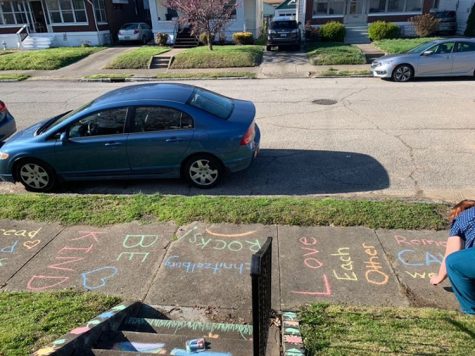
Donations are collected through The Publishers, duPont Manual High School’s booster club for J&C. Your donation will support the student journalists of duPont Manual High School. Your contribution will provide equipment and cover annual website hosting costs.



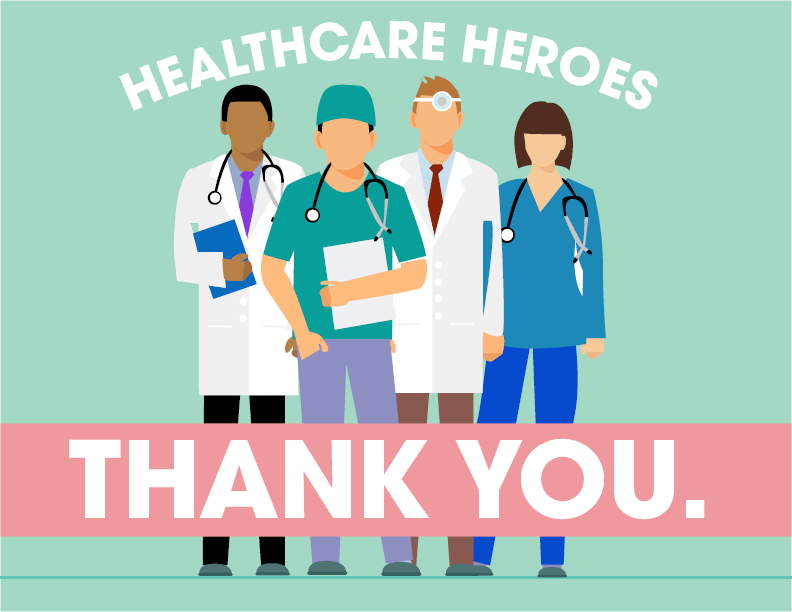
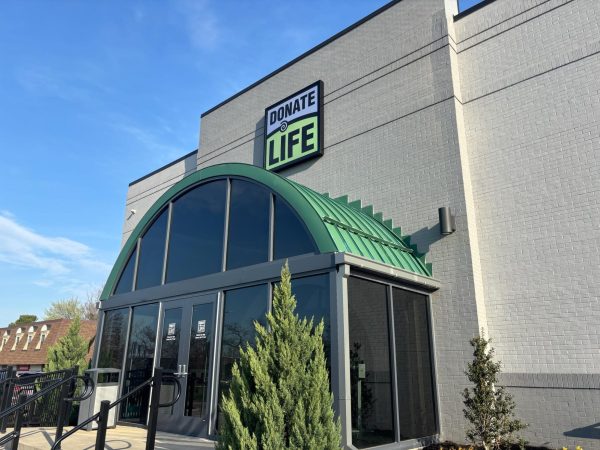
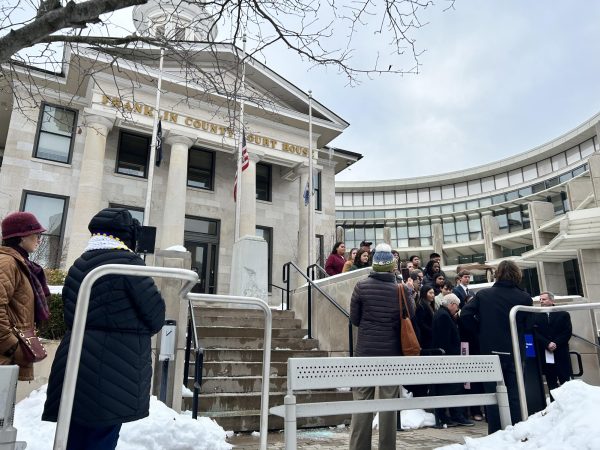

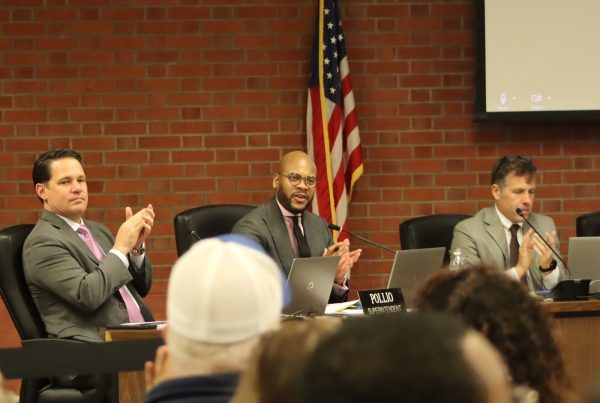
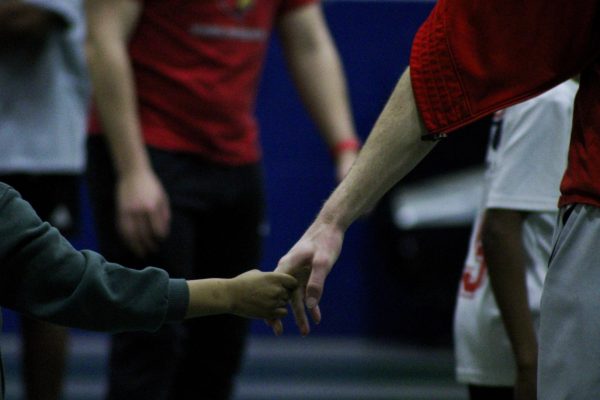
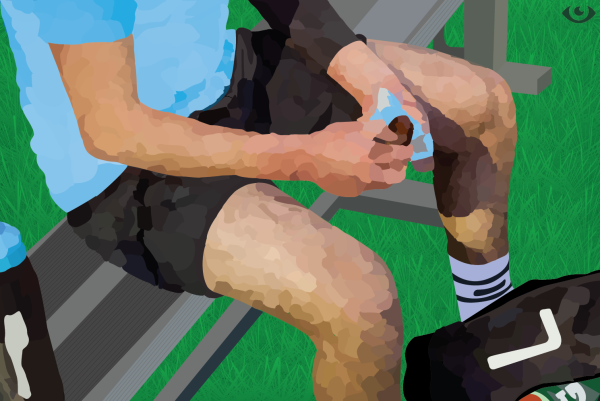
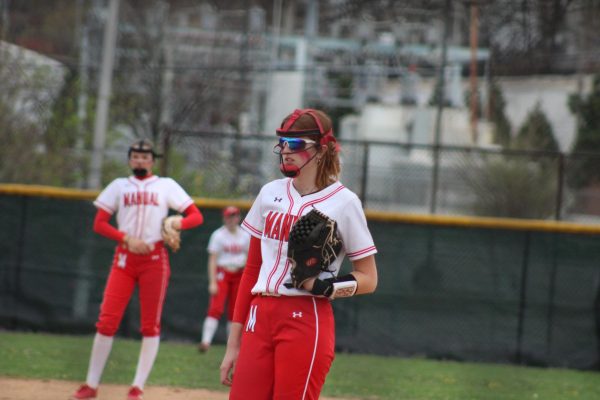
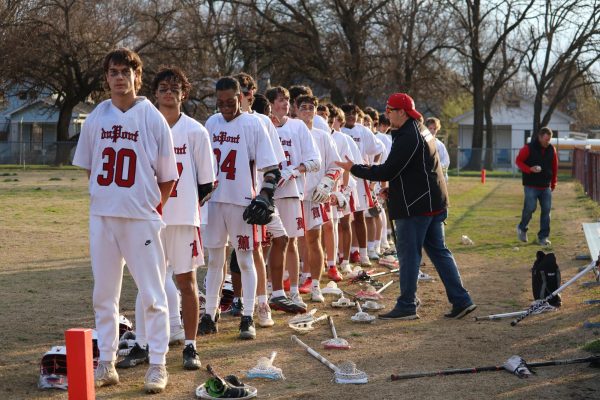
Fernando Dawson • May 11, 2020 at 2:08 pm
Great article from people who are living this everyday. Be kind to your health care worker’s because they are dealing with life and death everyday and it effects them deeply.